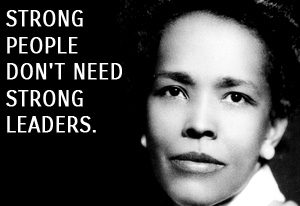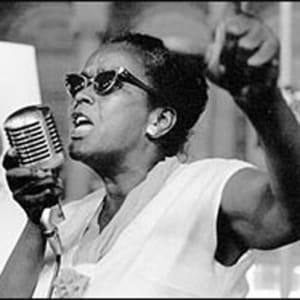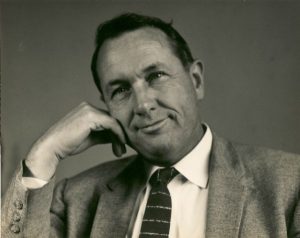What is the Purpose of a Leader?

Ella Baker. (n.d.). Retrieved May 8, 2020, from https://www.quote-coyote.com/quotes/authors/b/ella-baker/quote-4313.html.
Ella Baker stated, “‘Strong people don’t need strong leaders,’” (Baker, quoted by Payne, 1989, p. 893). The goal of becoming a leader, an educator, or an organizer, is not to be the strongest, the most overpowering, or even the most knowledgeable. This poses the question, then, of what is the purpose of a leader. In both Charles Payne’s “Ella Baker and Models of Social Change” and Carol Mueller’s “Ella Baker and the Origins of ‘Participatory Democracy’”, Ella Baker’s idea of a “group-centered leader” identifies the goals of a leader or an organizer. In addition to Ella Baker, other activists such as Myles Horton and Paulo Freire in We Make the Road by Walking: Conversations on Education and Social Change also build on the idea of a “group-centered leader” even in other contexts such as relating to education. It is evident from these three organizers that in order to become a “group-centered leader”, the leader must build techniques that strive to create independent thinkers who are able to find their own voice and solve problems without always having their leader present.

Ella Baker was a strong advocate for community organizing by bringing power to the people. Ella Baker. (2020, January 22). Retrieved May 8, 2020, from https://www.biography.com/activist/ella-baker
Ella Baker believed in the importance of working closely with individuals of a particular group and allowing them to find their voice in order to participate in their community. Baker vocalized this by stating, “‘citizens themselves must be conscious of the fact that [participating in decisions that affect their lives] is their right’” (Baker, quoted by Mueller, 2004, p. 84). With that being said, a “group-centered leader” has the job of allowing people to recognize the power that they hold to share their opinions and make an impact. Essentially, the leader’s job is not to give the group members a voice, but rather to help them discover their own voice.

Myles Horton began the Highlander Folk School in 1932 to educate activists. Myles Horton. (n.d.). Retrieved May 8, 2020, from https://snccdigital.org/people/myles-horton/
In We Make the Road by Walking, Myles Horton emphasizes the importance of this tactic and how to veer away from merely using one’s own expertise to provide an answer. Instead, the leader must simply supply the individual with the tools necessary to come up with decisions on their own. He relays an experience he had where a group of parents was having issues with an “integrated” system that was not treating their students fairly. Horton brought in one of his friends, a lawyer, to come to give them some legal information about how they could file a lawsuit. After teaching the parents the information, the lawyer wanted to give them legal advice on what their next steps should be, however, Horton intervened. He recalls, “I didn’t want the expert to tell them what to do. I wanted the expert to tell them the facts and let them decide what to do,” (Horton and Freire, 1990, p. 129). If the expert had simply told the parents what to do, then the next time they were placed in this situation, they would not have had the skills necessary to put together a solution independently of the lawyer. Therefore, Horton was acting as a “group-centered leader” who allowed the parents to find their own voice.
